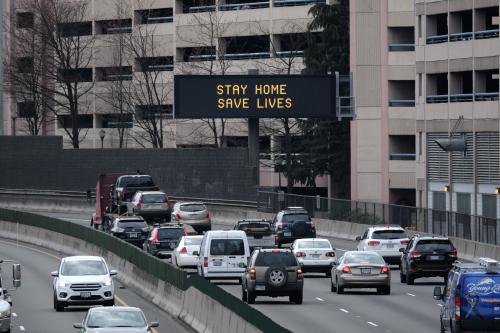Editor’s Note: This piece originally appeared in the Washington Post on March 28, 2020.
For weeks, officials in both parties have urged the Trump administration to fight the coronavirus pandemic by invoking the Defense Production Act (DPA) to encourage and enable manufacturers to produce critical medical equipment — and quickly.
The administration’s response has been bizarre. The president authorized using the law, then said it wasn’t needed because industry is doing enough voluntarily (a claim that clearly isn’t true). Federal Emergency Management Agency Administrator Peter T. Gaynor announced Tuesday that the DPA would help get test kits to New York, but later that day reversed course. A series of Trump tweets early Friday added to the confusion before the White House announced it would use the act to compel General Motors to make more ventilators and more quickly than the company had planned to produce. Meanwhile, the virus continues to spread, and there is a critical shortage of other medical equipment.
One point needs to be emphasized: The Trump administration, like its predecessors, regularly uses the Defense Production Act — but until Friday it had refused to use it to help the victims of covid-19. The Defense Department has used the act for 70 years with bipartisan support from Congress and industry. FEMA routinely uses it in responding to hurricanes and floods. Regardless of why the law wasn’t invoked earlier, the issue now is whether it will actually be used to ramp up production of other critical medical equipment.
As assistant secretary of defense in the 1990s, I administered some Defense Production Act authorities. The act allows federal agencies to collaborate with business to get critical supplies during emergencies — by encouraging investment and speeding production — and direct them to where they’re most needed.
Some have argued, naively, that the federal government doesn’t need to do this and that governors such as Andrew M. Cuomo of New York and Mike DeWine of Ohio, or even hundreds of hospitals, should attempt to negotiate with industries on their own. Even if they had the legal authorities conveyed by the Defense Production Act — which they don’t — there would still be a need for an organization to decide which needs are most urgent.
As the novel coronavirus has spread, there has been a worldwide scramble for masks, ventilators, test kits and other medical equipment. Companies that make these products sell to whichever buyer orders first; they generally don’t worry about priorities, or whether the items are resold or hoarded. Under the Defense Production Act, the federal government can, like a traffic cop, direct that inventories be allocated where they are needed most urgently. That’s what FEMA does during floods and hurricanes (and what it said it would do for covid-19 tests before reversing course Tuesday).
The DPA also allows government to move its orders to the front of the line. The Defense Department does this regularly, but the act can be used for more than defense: For instance, presidents Bill Clinton and George W. Bush invoked the law to move energy resources to California to help prevent blackouts.
The government can also use the act to order, and then pay for, expanded production, with new products or new plant capacity. The Defense Department uses it to ensure adequate stockpiles of supplies as varied as ammunition and exotic metals, as well as the capability to make more of them.
In emergencies and wartime, businesses don’t know how much of a given product may be needed or for how long. A ventilator maker might know that fighting covid-19 will require, say, 500,000 machines but fear that the need could last only three months or that demand might be filled by Chinese imports. Would that company invest millions in an expanded plant? Probably not. That’s where the DPA helps: The government can commit to buy the whole needed supply at a price that makes the investment worthwhile. It can also encourage firms to collaborate without fear of antitrust litigation. That’s what Britain’s Conservative government is doing to make sure its people have ventilators.
The Defense Production Act can also replace the lengthy, bureaucratic government purchasing process with direct negotiation. This is what the administration appears to want to do with GM, but the act can do far more. Under the traditional process, companies submit bid packages; agencies review them under the thousand-plus-page Federal Acquisition Regulation and send out award notices; and then everyone waits to see if anyone protests the awards. The process takes months.
Under the DPA, however, agency officials can negotiate with manufacturers and immediately decide who will produce how many masks at what price. Had the Department of Health and Human Services used the act last month when it decided to buy 500 million protective masks, some masks would already have been delivered to health personnel, and manufacturers would already be making more. Furthermore, GM would probably already be making ventilators.
Some, mostly those who have never been near a war, have argued against using the DPA. One hears rhetoric about socialism, government takeovers and red tape. These are false arguments. There is no government ownership, nor does government run private businesses.
The administration needs to act quickly, using all of its authority to procure not just ventilators but also test kits, masks and other equipment for health-care workers and covid-19 victims. Lives depend on it.
The Brookings Institution is committed to quality, independence, and impact.
We are supported by a diverse array of funders. In line with our values and policies, each Brookings publication represents the sole views of its author(s).







Commentary
Op-edUse the Defense Production Act for more than just ventilators
March 30, 2020